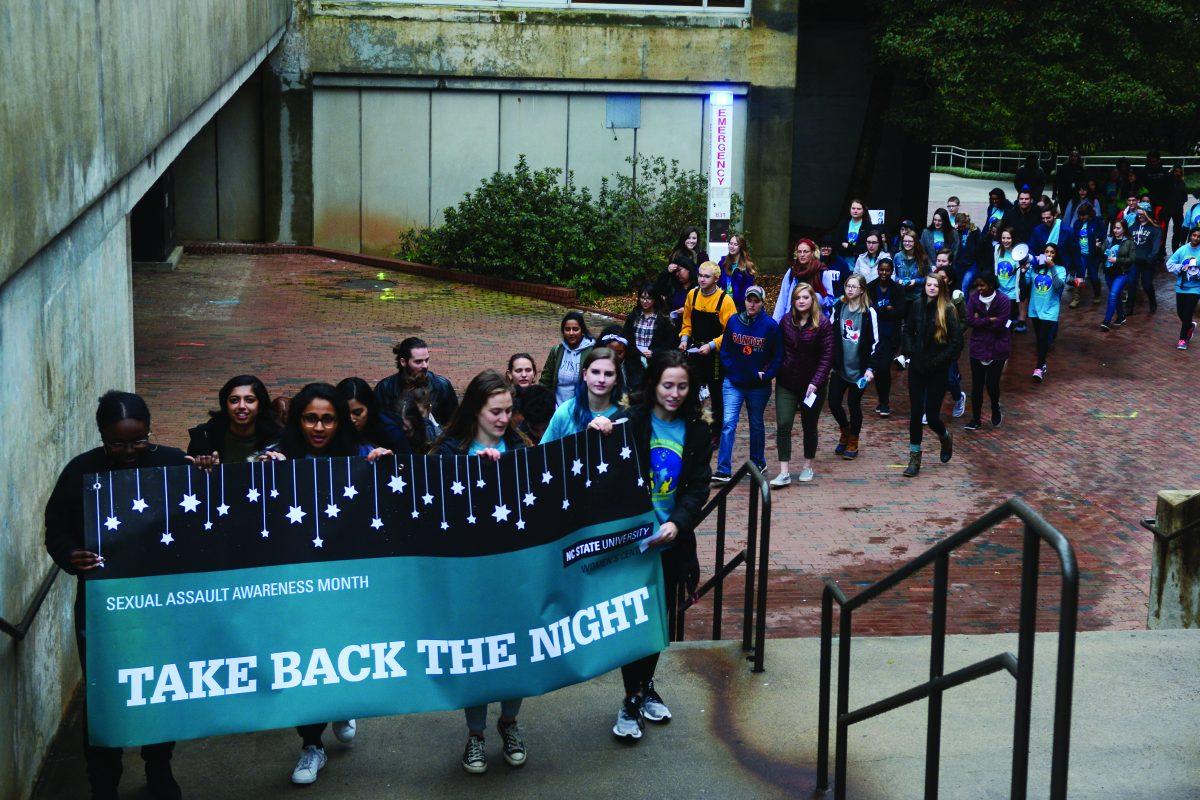Editor’s Note: This article contains reference to sexual assault.
The annual Take Back the Night event is dedicated to bringing awareness and support to the survivors of sexual assault by providing a safe space to discuss survivors’ stories.
This year’s event will begin in the Women’s Center on April 15, located on the fifth floor of Talley Student Union, and will consist of a rally and march across campus, Survivor Speak Out, a resource fair for food and healing.
Kylin Adams, assistant director for interpersonal violence, prevention education and training for the Women’s Center, said the event is an opportunity for the community to come together.
“It’s just a wonderful time for us to come together, as both NC State community, but a larger Raleigh community,” Adams said. “To take a stand against interpersonal violence, and be in allyship with each other.”
Adams said the event is rooted in years of tradition with a focus on providing a safe, confidential space for survivors to share their stories.
“The Survivor Speak Out is a confidential space for students if they just have something that they want to share about their own survivorship or the culture of interpersonal violence that they have been experiencing or exposed to here at NC State,” Adams said. “It’s a confidential space for them to talk about that.”
Indigo Weaver, a third-year studying nutrition science and director of outreach for The Movement, said Take Back the Night has had impacts on survivor empowerment and the Women’s Center tradition for years.
“Globally, there have been protests against sexual assault and sexual violence for hundreds of years,” Weaver said. “[Take Back the Night] is a larger reflection of what the Women’s Center and the movement as a whole are trying to offer.”
Jordan Abernathy, a third-year studying anthropology and the director of communication for The Movement, said the event is designed to provide support to and empower survivors.
“[Take Back the Night] is about reclaiming the night for women as a safe space as well, just empowering women against interpersonal and gender violence,” Abernathy said. “As the moon peer educators and as a women’s center as a whole, we’re here for every step of the way.”
Abernathy said Take Back the Night is survivor-focused, but anyone is welcome and encouraged to join.
“We talk about support systems a lot as a resource, just for survivors, just to be there and be someone who is able to handle, you know, whatever may come,” Abernathy said. “This is a way to get connected with people, learn, even just have fun.”
Danica Plihcik, a third-year studying anthropology and the director of administration for The Movement, echoed Abernathy’s point that the resources highlighted in Take Back the Night are for everyone, not just survivors.
“It’s very based in empowering women, identifying people or just victims of sexual assault or misconduct,” Plihcik said. “I think some of the messaging, aside from just feeling empowered to take back the night and your autonomy, that we are offering a lot of resources, and we just want those to be available to everyone.”
Weaver said trained counselors will be available during the event to speak with survivors.
“We have trained counselors in sort of a closed room where survivors are able to more specifically tell their stories and receive comfort and help in a place where they would normally be able to,” Weaver said. “We’re all trained in trauma-informed care at the start before we can facilitate any workshops.”
Plihcik and Adams emphasized that people can show their support for survivors by simply showing up for the event.
“Whether or not you have personally been affected, and you know, somebody that’s been affected,” Plihcik said. “That’s the biggest thing is to just show up and be there as a community.”
“Whether we like to face it or not, people we know, or ourselves, have been sexually assaulted, willingly or unwillingly, we might not know that,” Adams said. “It’s important that we have events like this to be like us as a community. We must go together, we must figure this out and we must bring awareness to it.”
Adams said students and allies of survivors wanting to participate in the Take Back the Night event can show support in many ways.
“Come make a sign,” Adams said. “Come march with us. We’re gonna go all around campus. We’re gonna hit the hot spots and the really significant areas of NC State.”
If you or someone you know is experiencing relationship violence, sexual violence, stalking or any other form of interpersonal violence and are in need of advocacy services, the NC State Women’s Center has trained advocates available to offer crisis intervention, emotional support, resources and referrals. Students can contact the 24/7 Sexual Assault Helpline at 919-515-4444 or email ncsuadvocate@ncsu.edu to schedule an appointment with an advocate.
Advocacy services through the NC State Women’s Center are available for all students inclusive of all gender identities and sexual orientations.
For more information on advocacy services, please visit go.ncsu.edu/supportsurvivors. If you would like to talk to a confidential resource, you can also connect with the NC State Counseling Center at 919-515-2423. You may also visit go.ncsu.edu/safe for additional information on resources and reporting options.








